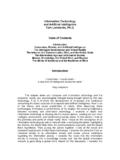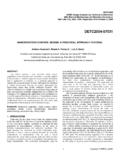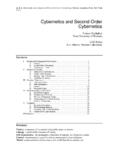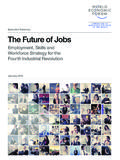Transcription of AI, Robotics, and the Future of Jobs - fusbp.com
1 AI, Robotics, and the Future of Jobs BY AARON SMITH AND JANNA ANDERSON Key Findings The vast majority of respondents to the 2014 Future of the Internet canvassing anticipate that robotics and artificial intelligence will permeate wide segments of daily life by 2025, with huge implications for a range of industries such as health care, transport and logistics, customer service, and home maintenance. But even as they are largely consistent in their predictions for the evolution of technology itself, they are deeply divided on how advances in AI and robotics will impact the economic and employment picture over the next decade. We call this a canvassing because it is not a representative, randomized survey. Its findings emerge from an opt in invitation to experts who have been identified by researching those who are widely quoted as technology builders and analysts and those who have made insightful predictions to our previous queries about the Future of the Internet.
2 (For more details, please see the section About this Report and Survey. ) Key themes: reasons to be hopeful 1. Advances in technology may displace certain types of work, but historically they have been a net creator of jobs. 2. We will adapt to these changes by inventing entirely new types of work, and by taking advantage of uniquely human capabilities. 3. Technology will free us from day-to-day drudgery, and allow us to define our relationship with work in a more positive and socially beneficial way. 4. Ultimately, we as a society control our own destiny through the choices we make. Key themes: reasons to be concerned 1. Impacts from automation have thus far impacted mostly blue-collar employment; the coming wave of innovation threatens to upend white-collar work as well. 2. Certain highly-skilled workers will succeed wildly in this new environment but far more may be displaced into lower paying service industry jobs at best, or permanent unemployment at worst.
3 3. Our educational system is not adequately preparing us for work of the Future , and our political and economic institutions are poorly equipped to handle these hard choices. Some 1,896 experts responded to the following question: The economic impact of robotic advances and AI Self-driving cars, intelligent digital agents that can act for you, and robots are advancing rapidly. Will networked, automated, artificial intelligence (AI) applications and robotic devices have displaced more jobs than they have created by 2025? Half of these experts (48%) envision a Future in which robots and digital agents have displaced significant numbers of both blue- and white-collar workers with many expressing concern that this will lead to vast increases in income inequality, masses of people who are effectively unemployable, and breakdowns in the social order.
4 The other half of the experts who responded to this survey (52%) expect that technology will not displace more jobs than it creates by 2025. To be sure, this group anticipates that many jobs currently performed by humans will be substantially taken over by robots or digital agents by 2025. But they have faith that human ingenuity will create new jobs, industries, and ways to make a living, just as it has been doing since the dawn of the Industrial Revolution. These two groups also share certain hopes and concerns about the impact of technology on employment. For instance, many are concerned that our existing social structures and especially our educational institutions are not adequately preparing people for the skills that will be needed in the job market of the Future . Conversely, others have hope that the coming changes will be an opportunity to reassess our society s relationship to employment itself by returning to a focus on small-scale or artisanal modes of production, or by giving people more time to spend on leisure, self-improvement, or time with loved ones.
5 A number of themes ran through the responses to this question: those that are unique to either group, and those that were mentioned by members of both groups. The view from those who expect AI and robotics to have a positive or neutral impact on jobs by 2025 JP Rangaswami, chief scientist for , offered a number of reasons for his belief that automation will not be a net displacer of jobs in the next decade: The effects will be different in different economies (which themselves may look different from today s political boundaries). Driven by revolutions in education and in technology, the very nature of work will have changed radically but only in economies that have chosen to invest in education, technology, and related infrastructure. Some classes of jobs will be handed over to the immigrants of AI and Robotics, but more will have been generated in creative and curating activities as demand for their services grows exponentially while barriers to entry continue to fall.
6 For many classes of jobs, robots will continue to be poor labor substitutes. Rangaswami s prediction incorporates a number of arguments made by those in this canvassing who took his side of this question. Argument #1: Throughout history, technology has been a job creator not a job destroyer Vint Cerf, vice president and chief Internet evangelist for Google, said, "Historically, technology has created more jobs than it destroys and there is no reason to think otherwise in this case. Someone has to make and service all these advanced devices. Jonathan Grudin, principal researcher for Microsoft, concurred: Technology will continue to disrupt jobs, but more jobs seem likely to be created. When the world population was a few hundred million people there were hundreds of millions of jobs.
7 Although there have always been unemployed people, when we reached a few billion people there were billions of jobs. There is no shortage of things that need to be done and that will not change. Michael Kende, the economist for a major Internet-oriented nonprofit organization, wrote, In general, every wave of automation and computerization has increased productivity without depressing employment, and there is no reason to think the same will not be true this time. In particular, the new wave is likely to increase our personal or professional productivity ( self-driving car) but not necessarily directly displace a job ( chauffeur). While robots may displace some manual jobs, the impact should not be different than previous waves of automation in factories and elsewhere. On the other hand, someone will have to code and build the new tools, which will also likely lead to a new wave of innovations and jobs.
8 Fred Baker, Internet pioneer, longtime leader in the IETF and Cisco Systems Fellow, responded, My observation of advances in automation has been that they change jobs, but they don t reduce them. A car that can guide itself on a striped street has more difficulty with an unstriped street, for example, and any automated system can handle events that it is designed for, but not events (such as a child chasing a ball into a street) for which it is not designed. Yes, I expect a lot of change. I don't think the human race can retire en masse by 2025. Argument #2: Advances in technology create new jobs and industries even as they displace some of the older ones Ben Shneiderman, professor of computer science at the University of Maryland, wrote, Robots and AI make compelling stories for journalists, but they are a false vision of the major economic changes.
9 Journalists lost their jobs because of changes to advertising, professors are threatened by MOOCs, and store salespeople are losing jobs to Internet sales people. Improved user interfaces, electronic delivery (videos, music, etc.), and more self-reliant customers reduce job needs. At the same time someone is building new websites, managing corporate social media plans, creating new products, etc. Improved user interfaces, novel services, and fresh ideas will create more jobs. Amy Webb, CEO of strategy firm Webbmedia Group, wrote, There is a general concern that the robots are taking over. I disagree that our emerging technologies will permanently displace most of the workforce, though I d argue that jobs will shift into other sectors. Now more than ever, an army of talented coders is needed to help our technology advance.
10 But we will still need folks to do packaging, assembly, sales, and outreach. The collar of the Future is a hoodie. John Markoff, senior writer for the Science section of the New York Times, responded, You didn t allow the answer that I feel strongly is accurate too hard to predict. There will be a vast displacement of labor over the next decade. That is true. But, if we had gone back 15 years who would have thought that search engine optimization would be a significant job category? Marjory Blumenthal, a science and technology policy analyst, wrote, In a given context, automated devices like robots may displace more than they create. But they also generate new categories of work, giving rise to second- and third-order effects. Also, there is likely to be more human-robot collaboration a change in the kind of work opportunities available.






